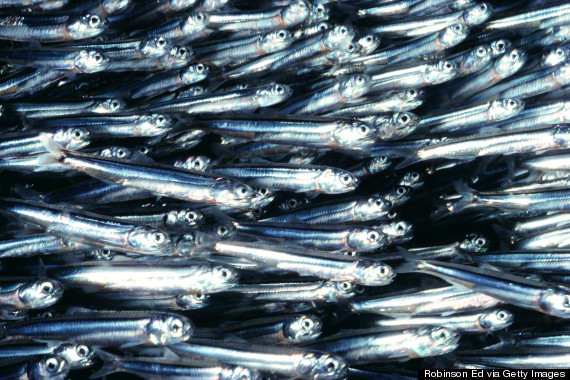
All things considered, 2013 was not the best year for fish news. We learned all about the dangers of contaminated fish sources and, just in December, a large-scale study published in The Journal of Nutrition found some evidence to contradict the commonly held belief that a fish-rich diet improved cognitive function in old age.
But, looking forward, the news gets better: In its first issue of 2014, the Journal of the Academy of Nutrition and Dietetics released a new position on fat intake, promoting fatty fish as the go-to source for polyunsaturated fatty acids:
It is the position of the Academy of Nutrition and Dietetics that dietary fat for the healthy adult population should provide 20 percent to 35 percent of energy, with an increased consumption of n-3 polyunsaturated fatty acids and limited intake of saturated and trans fats.
Two "long-chain" omega-3 fatty acids found in fish, EPA (eicosapentaenoic acid) and DHA (docosahexaenoic acid), are not made by the human body, meaning we need to eat them from a dietary source. Many people get omega-3 fatty acids from plant sources like flax seeds and walnuts, though this type of "good" fat -- alpha-linolenic acid -- only partially converts to EPA and DHA in the body and doesn't have the same amount of research behind it that omega-3s derived from fish do. Here are nine reasons to eat fish for your health:
Save your eyesight

In a large-scale study of French subjects, researchers found that eating a diet high in omega-3 fatty acids was strongly correlated with a reduced risk of age-related macular degeneration, a degenerative condition in which the central retina becomes damaged. It is the most common cause of lost eyesight in elderly populations.
Cut your risk of a deadly heart attack
Heart disease is the leading cause of death among U.S. adults, but eating a diet rich in fatty fish may help reduce your risk of dying from the disease.
In a meta-analysis of several observational and controlled studies, Harvard School of Public Health professors Dariush Mozaffarian and Eric Rimm discovered that eating fatty fish once or twice a week, for a total omega-3 fatty acid intake of 2 grams, reduced a person's risk of cardiac death by 36 percent and of death from any cause by 17 percent.
Although fish stocks are often polluted with small amounts of toxicants, including mercury, PCBs and dioxins, the American Heart Association states that the potential danger is outweighed by the benefit of fish's nutrient density. They aren't just making that up: A 2011 study, also performed by Mozaffarian, found that among a cohort of 173,000 men and women, those who consumed a great deal of fish and also had the highest concentrations of mercury (as measured by toenail clippings) still had a 15 percent lower risk of heart disease compared with those who had the lowest concentrations -- indicating a diet low in seafood.
Enhance your brainpower

If you've got an important presentation or exam coming up, you might want to chow down on fatty fish before the big day, according to recent research published in PLOS One.
Researchers gave the fish oil-derived omega-3 supplement Lovaza to a group of men and women between the ages of 18 and 25 (when they are considered "at the top of their game," cognitively speaking) and then conducted a well-known test of working memory several times over the course of six months. As the group continued their course of supplements, their performance on the tests steadily improved.
"Before seeing this data, I would have said it was impossible to move young healthy individuals above their cognitive best," lead investigator Bita Moghaddam, a professor of neuroscience at the University of Pittsburgh, said in a statement.
By comparing results with previous research in rats, the researchers found evidence to suggest that a lack of omega-3 fatty acids can lower stores of the neurotransmitter dopamine, which is linked to working memory.
Halve your risk of rheumatoid arthritis
Rheumatoid arthritis is one of the most common forms of arthritis, which is characterized by the chronic experience of swollen, inflamed and aching joints. But for women, just one serving of fatty fish -- or four servings of lean fish -- could reduce the risk of developing the chronic auto-immune disease, rheumatoid arthritis, according to research gleaned from the Karolinska Institute's Swedish Mammography Cohort Study. The researchers found that of the 32,000 women studied, those who consumed 210 milligrams of omega-3 fatty acids each day -- the equivalent of one weekly serving of fatty fish or four lean fish servings -- were 52 percent less likely to develop rheumatoid arthritis when all other factors were controlled.
Improve your baby's development

A healthy diet of omega-3s is also important during pregnancy for the development of a fetus's brain and nervous system. One 2007 study published in The Lancet found that women who consumed fewer than three to four servings of seafood each week (about 12 ounces) were significantly more likely to have children with low levels of verbal IQ and problems with fine motor skills, social development and communication -- all signs of delayed brain development. What's more, the researchers found that the risk of nutrient loss outweighed the ill effects of trace contaminant exposure from the seafood.
Live longer
Eating fish could help you live longer, according to a new review of a long-term cohort study. Researchers found that study participants who had high blood levels of the fatty acids found in fish oil -- docosahexaenoic acid (DHA), eicosapentaenoic acid (EPA) and docosapentaenoic acid (DPA) -- were also 27 percent less likely to die during the 16-year study period and lived an average of two years longer than participants who had low levels of these healthful fats, reported TIME.
Breathe easier

Many parents, fearful of a seafood allergy, stay away from fish during a child's early life. And while any dietary consideration should be made in conjunction with a pediatrician, fish could have one benefit with a limited window of time.
Eating fish during early childhood might be a good way to stave off asthma, according to a Dutch study of 7,210 children. The researchers found that eating fish between the ages of six and twelve months had a 36 percent reduced risk of wheezing by age 4, compared to children who ate fish after age 1 -- or before six months, Reuters reported. This group also had a reduced risk of shortness of breath by 4 years, which is often a symptom of asthma in young children.
While the link requires more study to confirm a benefit, researchers theorize that the same anti-inflammatory benefits that make fish fats a good choice for arthritis prevention may also come in handy for asthma sufferers. Previous research has found a link between consuming fish oil and fewer attacks of a specific type of asthma, exercise-induced bronchoconstriction, in athletes.
Protect your skin
One component of fish oil, EPA, has many great skin benefits, including the ability to regulate the oil production that hydrates skin, according to an article in Health.
What's more, there's some evidence that eating fatty fish helps protect cells from free radical damage caused by the sun's UV-rays. That protection helps preserve skin's collagen, which in turn prevents wrinkles and sagging.
Up your, um, counts

For couples hoping to conceive, a man's diet may matter more than previously thought.
According to a recent Harvard study conducted on 156 men who were part of couples being treated for fertility issues at Massachusetts General Hospital Fertility Center, the 25 percent of participants who ate the most "dark meat" fish (read: fatty types like salmon, bluefish and tuna) had 34 percent higher sperm counts than those who ate the least amount.
